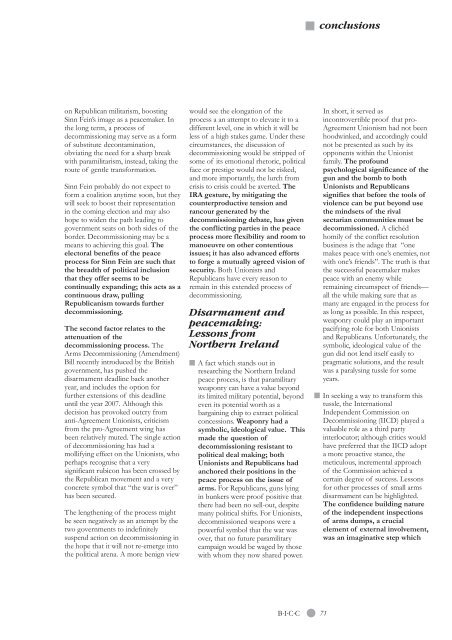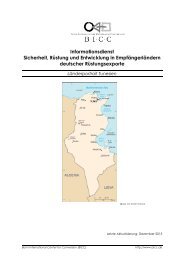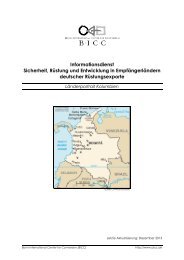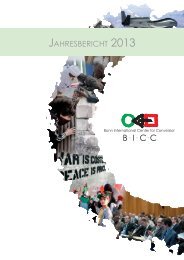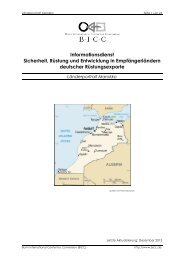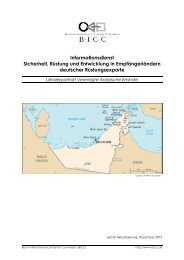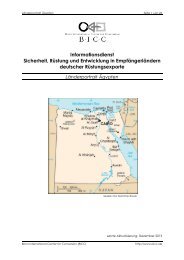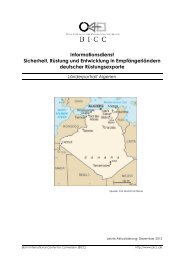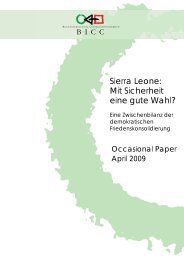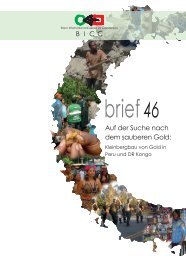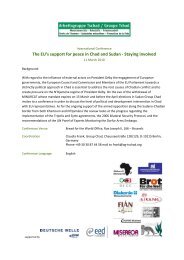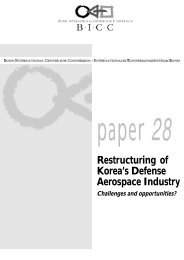English - BICC
English - BICC
English - BICC
Create successful ePaper yourself
Turn your PDF publications into a flip-book with our unique Google optimized e-Paper software.
on Republican militarism, boosting<br />
Sinn Fein’s image as a peacemaker. In<br />
the long term, a process of<br />
decommissioning may serve as a form<br />
of substitute decontamination,<br />
obviating the need for a sharp break<br />
with paramilitarism, instead, taking the<br />
route of gentle transformation.<br />
Sinn Fein probably do not expect to<br />
form a coalition anytime soon, but they<br />
will seek to boost their representation<br />
in the coming election and may also<br />
hope to widen the path leading to<br />
government seats on both sides of the<br />
border. Decommissioning may be a<br />
means to achieving this goal. The<br />
electoral benefits of the peace<br />
process for Sinn Fein are such that<br />
the breadth of political inclusion<br />
that they offer seems to be<br />
continually expanding; this acts as a<br />
continuous draw, pulling<br />
Republicanism towards further<br />
decommissioning.<br />
The second factor relates to the<br />
attenuation of the<br />
decommissioning process. The<br />
Arms Decommissioning (Amendment)<br />
Bill recently introduced by the British<br />
government, has pushed the<br />
disarmament deadline back another<br />
year, and includes the option for<br />
further extensions of this deadline<br />
until the year 2007. Although this<br />
decision has provoked outcry from<br />
anti-Agreement Unionists, criticism<br />
from the pro-Agreement wing has<br />
been relatively muted. The single action<br />
of decommissioning has had a<br />
mollifying effect on the Unionists, who<br />
perhaps recognise that a very<br />
significant rubicon has been crossed by<br />
the Republican movement and a very<br />
concrete symbol that “the war is over”<br />
has been secured.<br />
The lengthening of the process might<br />
be seen negatively as an attempt by the<br />
two governments to indefinitely<br />
suspend action on decommissioning in<br />
the hope that it will not re-emerge into<br />
the political arena. A more benign view<br />
would see the elongation of the<br />
process a an attempt to elevate it to a<br />
different level, one in which it will be<br />
less of a high stakes game. Under these<br />
circumstances, the discussion of<br />
decommissioning would be stripped of<br />
some of its emotional rhetoric, political<br />
face or prestige would not be risked,<br />
and more importantly, the lurch from<br />
crisis to crisis could be averted. The<br />
IRA gesture, by mitigating the<br />
counterproductive tension and<br />
rancour generated by the<br />
decommissioning debate, has given<br />
the conflicting parties in the peace<br />
process more flexibility and room to<br />
manoeuvre on other contentious<br />
issues; it has also advanced efforts<br />
to forge a mutually agreed vision of<br />
security. Both Unionists and<br />
Republicans have every reason to<br />
remain in this extended process of<br />
decommissioning.<br />
Disarmament and<br />
peacemaking:<br />
Lessons from<br />
Northern Ireland<br />
A fact which stands out in<br />
researching the Northern Ireland<br />
peace process, is that paramilitary<br />
weaponry can have a value beyond<br />
its limited military potential, beyond<br />
even its potential worth as a<br />
bargaining chip to extract political<br />
concessions. Weaponry had a<br />
symbolic, ideological value. This<br />
made the question of<br />
decommissioning resistant to<br />
political deal making; both<br />
Unionists and Republicans had<br />
anchored their positions in the<br />
peace process on the issue of<br />
arms. For Republicans, guns lying<br />
in bunkers were proof positive that<br />
there had been no sell-out, despite<br />
many political shifts. For Unionists,<br />
decommissioned weapons were a<br />
powerful symbol that the war was<br />
over, that no future paramilitary<br />
campaign would be waged by those<br />
with whom they now shared power.<br />
B·I·C·C<br />
conclusions<br />
In short, it served as<br />
incontrovertible proof that pro-<br />
Agreement Unionism had not been<br />
hoodwinked, and accordingly could<br />
not be presented as such by its<br />
opponents within the Unionist<br />
family. The profound<br />
psychological significance of the<br />
gun and the bomb to both<br />
Unionists and Republicans<br />
signifies that before the tools of<br />
violence can be put beyond use<br />
the mindsets of the rival<br />
sectarian communities must be<br />
decommissioned. A clichéd<br />
homily of the conflict resolution<br />
business is the adage that “one<br />
makes peace with one’s enemies, not<br />
with one’s friends”. The truth is that<br />
the successful peacemaker makes<br />
peace with an enemy while<br />
remaining circumspect of friends—<br />
all the while making sure that as<br />
many are engaged in the process for<br />
as long as possible. In this respect,<br />
weaponry could play an important<br />
pacifying role for both Unionists<br />
and Republicans. Unfortunately, the<br />
symbolic, ideological value of the<br />
gun did not lend itself easily to<br />
pragmatic solutions, and the result<br />
was a paralysing tussle for some<br />
years.<br />
In seeking a way to transform this<br />
tussle, the International<br />
Independent Commission on<br />
Decommissioning (IICD) played a<br />
valuable role as a third party<br />
interlocutor; although critics would<br />
have preferred that the IICD adopt<br />
a more proactive stance, the<br />
meticulous, incremental approach<br />
of the Commission achieved a<br />
certain degree of success. Lessons<br />
for other processes of small arms<br />
disarmament can be highlighted.<br />
The confidence building nature<br />
of the independent inspections<br />
of arms dumps, a crucial<br />
element of external involvement,<br />
was an imaginative step which<br />
71


